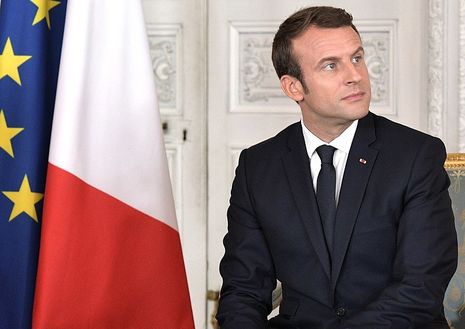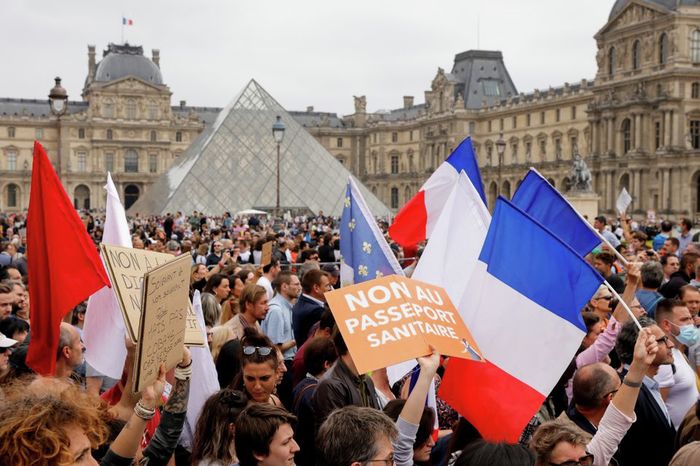Macron on course for a second term: harsh economic reform coupled with structural racism ahead
With the first round of the French presidential elections drawing closer, Eric Williams analyses the ideology and rhetoric of incumbent Macron

As the first round of the French presidential election nears, incumbent Emmanuel Macron looks on track to hold onto power for a second term. Far from standing as the defender of a tolerant, open society against the threat of hard-right xenophobia, the overt racism and Islamophobia of campaign discourse is a central feature of Macron’s politics and the long-term trends that propelled the President into the Élysée Palace in 2017.
With almost two months still to go before the first ballots are cast, reactionary targeting of the French Muslim population has already become a defining theme of the election. Far-right Reconquest party candidate, Eric Zemmour was joined last Sunday by the centre-right Les Républicains (LR) candidate Valérie Pécresse in espousing the ‘Great Replacement’ conspiracy theory. A variant of the neo-Nazi ‘white genocide’ conspiracy theory, the French ‘Great Replacement’, fabricated by ethnonationalist Renaud Camus, holds that elites are committing a ‘genocide by replacement’ against the ‘ethnic French’ through encouraging non-white, largely Muslim immigration in the pursuit of the destruction of ‘French civilization’. The adoption of a renowned fascist talking point by two leading candidates, collectively polling at 29% of the first-round vote, is a damning indication of the political establishment’s willingness to fuse French republican conceptions of an apparently colour-blind, secular and universal citizenship with reactionary nationalism and the targeting of minorities.
“Macron has graced xenophobia with an air of legitimacy and brought open Islamophobia into the political mainstream”
Over the course of his first term, Macron has repeatedly been guilty of cultivating this trend, gracing xenophobia with an air of legitimacy and bringing open Islamophobia into the political mainstream. Despite its marketing as a challenge against “separatism”, the ‘Strengthening Republic Values’ bill has been criticised as an attack on French Muslims’ civil liberties and freedom of association. Coupled with government rhetoric like Minister of Interior Gérald Darmanin’s criticism of Le Penn for not being “tough enough on Islam”, events such as the 2020 forced dissolution of the Collective Against Islamophobia in France (CCIF) reflect a broad enactment of repressive and discriminatory measures.
Macron’s ideology is the culmination of a decades-long decline of the French left since Mitterrand’s presidency in the 1980s. After the historic victory of the Parti Socialiste (PS) in 1981, an internal power struggle between those loyal to the party’s radical election programme and those pushing for a modernist, technocratic turn ended in the triumph of the ‘Second Left’. Led by Finance Minister Jacques Delors and Minister of Planning and Agriculture Michel Rocard, the victorious modernist wing realigned the PS away from its combined Keynesian, dirigiste and Marxist policies and asserted PS dominance over the Union de la Gauche alliance with the Parti Communiste and broader left-wing forces. Since then, Parti Socialiste has reliably implemented austerity policies in response to the budgetary constraints of European monetary unification and has increasingly acted in step with the French centre-right in a general pursuit of neoliberalisation and the dismantling of the socio-economic model which oversaw widely distributed improvements in living standards during the ‘Trente Glorieuses’ from 1945-75.
“This is the reality of France’s political landscape; a ‘President of the Rich’ at the head of a society plagued by deep inequality and structural racism”
As Economy Minister under Hollande’s Parti Socialiste government, Macron’s career blossomed during a concerted push in the 2010s to ‘reform’ French employment relations, transferring economic risk from the shoulders of companies onto workers. Indeed, Macron’s 2017 executive decrees on the French labour code were built on the precedent of the Loi Travail passed under Hollande’s presidency; undermining job security has been at the heart of Macron’s philosophy from the start, seen as a necessary sacrifice to achieve a competitive workforce and to free up private firms’ innovative potential.
Discrimination against minorities has proven compatible with Macron’s primary goal of reforming the French economic model; the dismantling of employment regulations and social protection has gone hand in hand with the abandonment of ideals of cultural freedom and tolerance. Given the demographics of Macron’s 2017 victory with a narrow and newly united voting bloc of asset-owning and educated upper-middle classes, the governing La République en Marche (LREM) party is operating with novel electoral incentives. Growing abstention rates amongst the popular classes, reflected in Parti Socialiste’s disastrous polling at a mere 2%, marks a new composition of electoral alliances. Without the expectations of the traditionally left-wing public-sector employees, low-wage white-collar and blue-collar working-class voters, Macron and LREM have been free to embark on a comprehensive attack on worker’s rights and social security, an approach that necessarily comes with an assault on the living standards of predominantly poor and working-class French Muslims concentrated in the country’s deprived banlieues.
This is the reality of France’s political landscape; a ‘President of the Rich’ at the head of a society plagued by deep inequality and structural racism. While the 2018 abolition of the ISF wealth tax and its replacement with the PFU flat tax on capital gains massively benefitted France’s richest 0.1%, the accompanying rise in fuel tax that triggered the gilets jaunes social movement was motivated not by an attempt to lower French carbon emissions, but rather to generate revenue from the popular classes to make up for the budgetary shortfall caused by the dismantling of the ISF tax. As the left remains in disarray, haunted by the legacies of ‘Second Left’ PS governments, Macron is thankfully set to defeat his right-wing challengers. However, the reactionary bent of his administration, epitomised in Minister of Higher Education Frédérique Vidal’s tirades against “Islamo-leftism”, suggest that even a best-case defeat of the Reconquest, National Rally and Les Républicains candidates will spell another five years of harsh economic reform coupled with xenophobia.
 News / Cambridge academics sign open letter criticising research funding changes22 February 2026
News / Cambridge academics sign open letter criticising research funding changes22 February 2026 News / Supporters protest potential vet school closure22 February 2026
News / Supporters protest potential vet school closure22 February 2026 News / University Council rescinds University Centre membership20 February 2026
News / University Council rescinds University Centre membership20 February 2026 News / Hundreds of Cambridge academics demand vote on fate of vet course20 February 2026
News / Hundreds of Cambridge academics demand vote on fate of vet course20 February 2026 Comment / A tongue-in-cheek petition for gowned exams at Cambridge 21 February 2026
Comment / A tongue-in-cheek petition for gowned exams at Cambridge 21 February 2026










